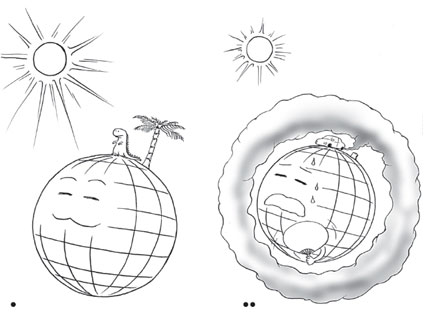Extreme weather a global warming wake-up call
This summer has been one of weather-related extremes in Russia, Pakistan, China, Europe, the Arctic - you name it. But does this have anything to do with global warming, and are human emissions to blame?
 |
|
Extreme weather a global warming wake-up call |
While it cannot be scientifically proven (or disproven, for that matter) that global warming caused any particular extreme event, we can say that global warming very likely makes many kinds of extreme weather both more frequent and more severe.
For weeks, central Russia has been in the grips of its worst-ever heat wave, which has caused probably thousands of fatalities.
As a result of drought and heat, more than 500 wildfires have raged out of control, smothering Moscow in smoke and threatening several nuclear facilities. Russia's government has banned wheat exports, sending world grain prices soaring.
Meanwhile, Pakistan is struggling with unprecedented flooding that has killed more than 1,000 people and affected an estimated 20 million more. In China, flash floods have so far killed more than 1,000 people and destroyed more than a million homes. On a smaller scale, European countries like Germany, Poland, and the Czech Republic have also suffered serious flooding.
Meanwhile, global temperatures in recent months have been at their highest levels in records that go back 130 years. Arctic sea-ice cover reached its lowest recorded average level for the month of June ever. In Greenland two huge chunks of ice broke off in July and August.
Are these events connected?
Looking only at individual extreme events will not reveal their cause, just like watching a few scenes from a movie does not reveal the plot. Viewed in a broader context, and using the logic of physics, important parts of the plot can be understood.
This decade has been marked by a number of stunning extremes. In 2003, the most severe heat wave in living memory broke previous temperature records by a large margin and caused 70,000 deaths in Europe. In 2005, the most severe hurricane season ever witnessed in the Atlantic devastated New Orleans and broke records in terms of the number and intensity of storms.
In 2007, unprecedented wildfires raged across Greece, nearly destroying the ancient site of Olympia. And the Northwest Passage in the Arctic became ice-free for the first time in living memory. Last year, more than a hundred people were killed in bush fires in Australia, following drought and record-breaking heat.
This cluster of record-breaking events could be merely an astonishing streak of bad luck. But that is extremely unlikely. This is far more likely to be the result of a warming climate - a consequence of this decade being, worldwide, the hottest for a thousand years.
Greenhouse gases
All weather is driven by energy, and the sun ultimately provides this energy. But the biggest change in Earth's energy budget by far over the past hundred years is due to the accumulation in our atmosphere of greenhouse gases, which limit the exit of heat into space.
Owing to fossil-fuel emissions, there is now one-third more carbon dioxide in the atmosphere than at any time in at least a million years, as the latest ice drilling in Antarctica has revealed.
The changes in the planet's energy budget caused by solar variations are at least 10 times smaller in comparison. And they go in the wrong direction: In recent years, the sun has been at its dimmest since satellite measurements began in the 1970s.
So, when unprecedented extreme weather events occur, the prime suspect is naturally the biggest atmospheric change that has happened over the past hundred years - one that has been caused by human emissions.
The fact that heat waves like the one in Russia become more frequent and extreme in a warmer world is easy to understand.
Extreme rainfall events will also become more frequent and intense in a warmer climate, owing to another simple fact of physics: Warm air can hold more moisture.
 0
0 







Go to Forum >>0 Comments